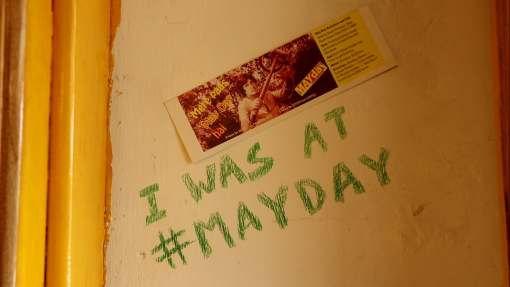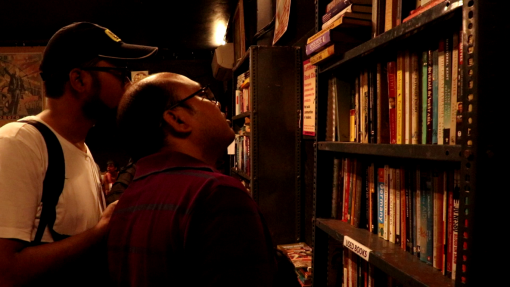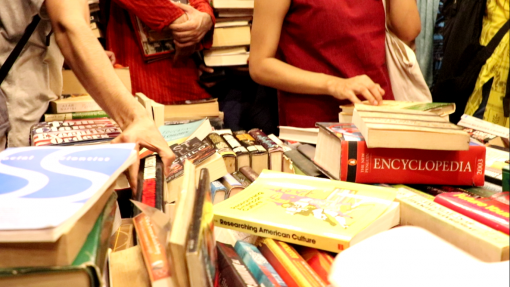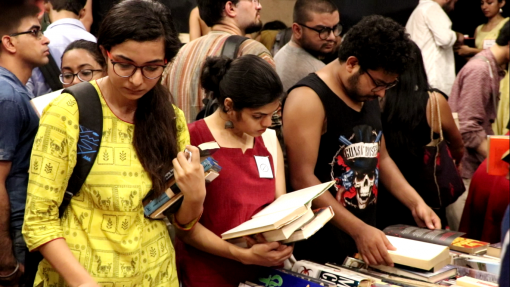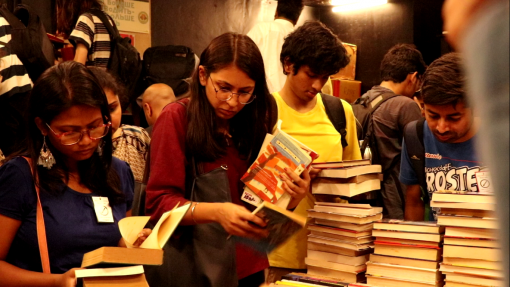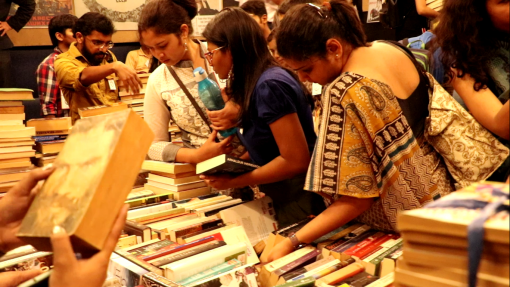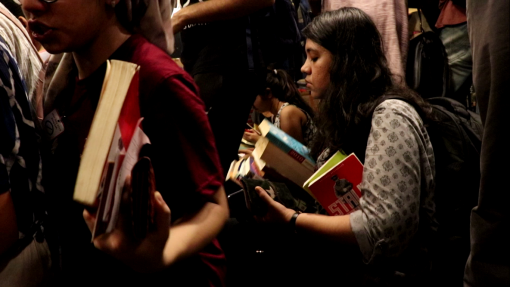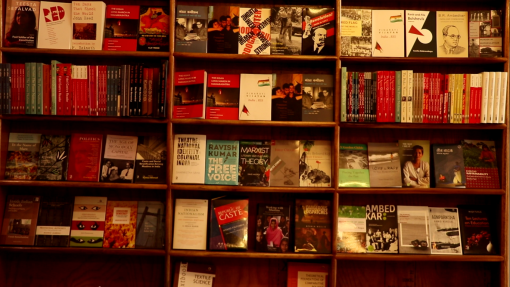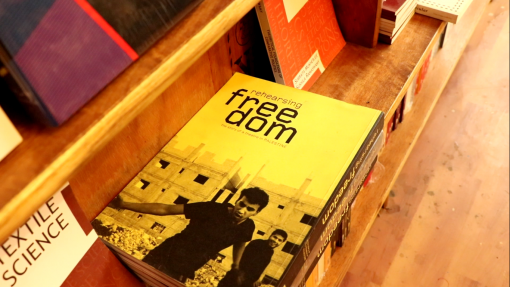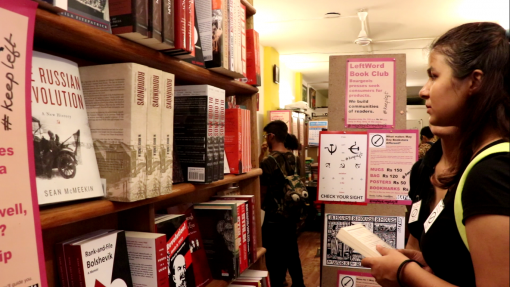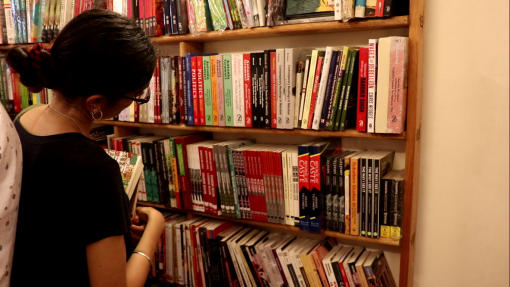“It’s interesting to have so many like-minded people together in one place. I did not know you when I came here, and you did not know me. So, maybe this is why I came here. But mostly I just came for the books,” said Abhisheik Shandilya, standing in a shady narrow by-lane of Shadi Khampur, trying to escape the sun.
Looking at the crowded entrance of May Day Bookstore and Café, he continued, “I came to know about this sale last year. Last year, it was half as crowded but still humid. This year, it’s more crowded and more humid.”
We were in Shadi Khampur, a tightly-packed residential and industrial neighbourhood in West Delhi. A few steps away was the inconspicuous May Day Bookstore & Café, Delhi’s only left-wing bookstore and cafe.
While its location is unlikely, it’s not accidental. Set up by Leftword Books, the location was chosen consciously because they wanted to work with the people in the neighbourhood. It is not just its location which makes it unique. It opens into Studio Safdar, a performance space set up by Jana Natya Manch (Janam). Janam makes sure to invite the locals to every one of their performances. The bookstore also carries titles from other independent publishers. The café runs on the goodwill of its customers, who pay whatever they feel like. “They have book sales throughout the year for the neighbourhood. They hold reading sessions for the kids from this neighbourhood on Sundays. It’s an inclusive space. It’s for the neighbourhood, the community; it’s for the people who live here,” says Ketaki, who is a regular at the bookstore and has been coming here since its inception in 2012.
The space is managed by Sudhanva Deshpande — actor, director at Janam, and managing editor at Leftword Books — and his amazing team.
The May Day Bookstore & Café first opened its doors six years ago on 1 May. Since then, it has held a celebration on 1 May every year. The occasion is not so much to celebrate their anniversary but, more importantly, it is to celebrate and commemorate May Day.
May Day or 1st of May — which originally began as a spring festival and continues to be celebrated as such in some parts of the world — is now also celebrated as Labour Day.
For the better part of the late 19th century, workers had been organising themselves into unions and agitating for a shorter work day without a cut in pay. The demand for an 8-hour work day was born out of these movements, popularised in the slogan, “8 hours of work, 8 hours of rest, and 8 hours for what we will.” In October 1884, the Federation of Organised Trades and Labour Unions declared that by May 1st,1886, an 8-hour work day should be adopted by all. As the date approached, multiple trade unions, workers, and other labour organisations started preparing for a general strike. On May 1st,1886, workers went on strike and rallies were held throughout the United States of America, with some estimates saying that upto half a million workers joined the strikes. Chicago, which was an industrial town and the centre of the 8-hour work day movement, saw the largest strike. Despite the large numbers, the crowd remained largely peaceful. In his essay, “The Brief Origins of May Day,” Eric Chase narrates the events that took place two days later, on 3 May,
…during a speech near the McCormick plant, some two hundred demonstrators joined the steelworkers on the picket line. Beatings with police clubs escalated into rock throwing by the strikers which the police responded to with gunfire. At least two strikers were killed and an unknown number were wounded.
Full of rage, a public meeting was called by some of the anarchists for the following day in Haymarket Square to discuss the police brutality. Due to bad weather and short notice, only about 3000 of the tens of thousands of people showed up from the day before. This affair included families with children and the mayor of Chicago himself. Later, the mayor would testify that the crowd remained calm and orderly and that speaker August Spies made “no suggestion… for immediate use of force or violence toward any person…”
(…)
As the police began to disperse the already thinning crowd, a bomb was thrown into the police ranks. No one knows who threw the bomb,…
Enraged, the police fired into the crowd. The exact number of civilians killed or wounded was never determined, but an estimated seven or eight civilians died, and up to forty were wounded. One officer died immediately and another seven died in the following weeks. Later evidence indicated that only one of the police deaths could be attributed to the bomb and that all the other police fatalities had or could have had been due to their own indiscriminate gun fire. …
Eight anarchists – Albert Parsons, August Spies, Samuel Fielden, Oscar Neebe, Michael Schwab, George Engel, Adolph Fischer and Louis Lingg – were arrested and convicted of murder, though only three were even present at Haymarket and those three were in full view of all when the bombing occurred.
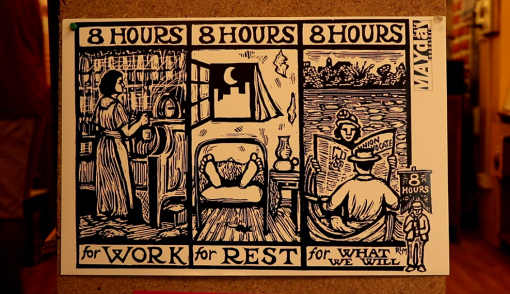
The events of 3 and 4 May, 1886 have now come to be known as the Haymarket Affair. The trial that followed is widely regarded as a miscarriage of justice. In 1904 the Second International (an international Socialist organisation which was formed on 14 July, 1889 in Paris, with delegates from over 20 countries) declared it the International Labour Day, calling on “all Social Democratic Party organisations and trade unions of all countries to demonstrate energetically on the First of May for the legal establishment of the 8-hour day, for the class demands of the proletariat, and for universal peace.”
May Day Bookstore & Café celebrates the occasion by organising a massive second-hand book sale and holding various live performances, along with the new books that are available in the bookstore. It is the only day of the year when the items from the café menu are sold at a fixed price. Another crowd puller is the mean coffee that’s available at the café counter, manned by the indefatigable Mukul Manglik.
This year, the day began with Mandeep Raikhy and his crew who performed a piece called “Saavdhaan.” As before, Rahul Ram and Sanjay Rajoura gave live performances. Two students, Soham and Somashree, performed live. They had come from Jadavpur Univeristy, Calcutta, especially for the event. Apart from these, there were performances and readings by Satyam Tiwari, Sumangala Damodaran, Raza Haider, Arundhati Ghosh, Srabani Chakraborty, and Mukul Manglik. Keith Goyden and Vasant Saberwal took charge of the café, preparing the baked goods that were on the menu for the day.
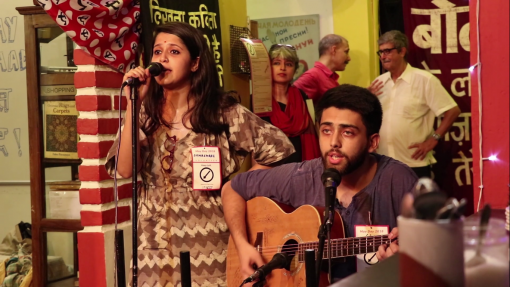
It was the second hand book sale which was the most popular part of the event. Over the years, it has acquired a reputation of its own, with many coming to the bookstore only for the book sale. In fact, book enthusiasts line up outside the bookstore even before the gates have been opened. In just six years, it has come to be one of the city’s most looked forward to book sales. Ashish, a final year law student from Delhi University, said he had been coming to the bookstore for three years “because their collection is pretty great. The rare books section and the coffee table cooks section are very cheap. And, of course, there’s the coffee.”
But what makes the May Day second hand book sale different in a city that has a thriving second-hand book market, as is evident from the street side Sunday book bazaar in Daryaganj, where books are often sold by the kilo? Abhisheik Shandilya — a member of the group Broke Bibliophiles (Delhi), which has previously held meetings at Studio Safar — answers it succinctly in a sentence, “I found Gore Vidal’s Burr here. I would have to score the entire street in Daryaganj to find a copy and I might still come up empty.” Elaborating further, he said, “I think an event like this, especially in the present political scenario, has a relevance of its own. We hardly ever talk about workers’ rights. So, if there’s one day to recognise them, to honour their struggles — and I know it’s wrong to just honour them on one day and forget them the rest of the year — we should make sure to celebrate it.”
The popularity of the book sale was evident from the fact that Studio Safdar, where the book sale was happening, had a tightly packed crowd practically throughout the day. The crowd only started thinning about 7 hours after the sale began.
But not all were happy with the second hand book sale. Sadaf Wani, a final year postgraduate student of Sociology from Delhi School of Economics, Sociology, and Geography, found the collection “disappointing.” She explained, “The bookstore is called May Day; it’s supposed to be a Left bookstore; today is May Day. So, there’s a clear theme. I would have liked it if the books in the second hand book sale had reflected that. The new books for sale at the bookshop were fine. But I do think celebrating May Day is important. There are such few events happening in the city that mark the occasion. Most people do nothing. So it’s quite commendable that the people at May Day organise this event each year, because it helps raise awareness of the day, and why it is significant. I think we need to have more of such events in Delhi.”
Every year, May Day Bookstore & Café gives a call for volunteers to help them with the event. This year too, they had an excellent team of dedicated volunteers who helped out at the event. In fact, they had been coming for the past 8 days, working every day for 4-6 hours straight, helping prepare for the event.
The dedication of the volunteers was apparent. While the visitors had the option of stepping out of the space to get some air (the packed bookstore and studio became quite stuffy quickly, with the tightly packed crowd adding to the general mugginess), the volunteers remained hard at work. Aditi, who was manning the cash counter at the book sale, said that they had already been warned by Deshpande about how hectic it was going to be. “I ended up having to stand for five hours straight while manning the cash counter because there weren’t enough chairs! But it was a good day. We made Rs 1,59,000 from the second hand book sale. I think that’s about Rs 29,000 more than last year. Although the sales from the new books at the bookstore were a little less than last year. We sold books worth Rs 1,15,000.”

Mahika, who works at The Bookshop in Jor Bagh, was volunteering for the May Day event for the second time in a row. For the past two years, she’s also been regularly volunteering at the May Day bookstore on the weekends. She pointed out that the event is the bookstore’s biggest fundraiser. “It’s a good day if we see five people walk into the bookstore. So, a day like this especially important. The funds raised on May Day help run the store. We also need funds to run the studio. It’s free for artists. But we do need funds to maintain the space, maintain the equipment.”
Talking about what she liked best, she added, “My favourite part were the locals who came in. Or, more like, the locals who were brought here by their kids. There was this little girl who dragged her mom here after she came back from school. She was still in her uniform. When her mom wanted to leave, she refused to go because she wanted to buy more books.”
She also spoke about how it helped the locals. “Most of the people come here by the metro. So they’re driven here by the rickshaw pullers, who know we are having this event. It’s a pretty big day for them because the increased number of passengers means they get to make more money. The neighbourhood chaiwallahs also end up making a good amount. Even the cigarette shops have a higher earning on May Day.”
The rickshaw pullers were of the same opinion. Ghulam Mohammad, who has been plying his rickshaw in the area for some 7-8 years, was quite enthusiastic about the event. “On any given day, we make about Rs 300. Maybe Rs 400, if it’s a good day. But since this place has opened up, every year on 1 May, we make a lot more. I’ve already made around Rs 700.” This was echoed by another rickshaw puller, Mohammad Suleman, who has also been plying his rickshaw here just as long. Unfortunately, though, neither of them seemed to know what the event was about except that there was a book sale.
That event saw a 500+ crowd, with the first time visitors out-numbering those who had come for the previous May Day celebrations.

